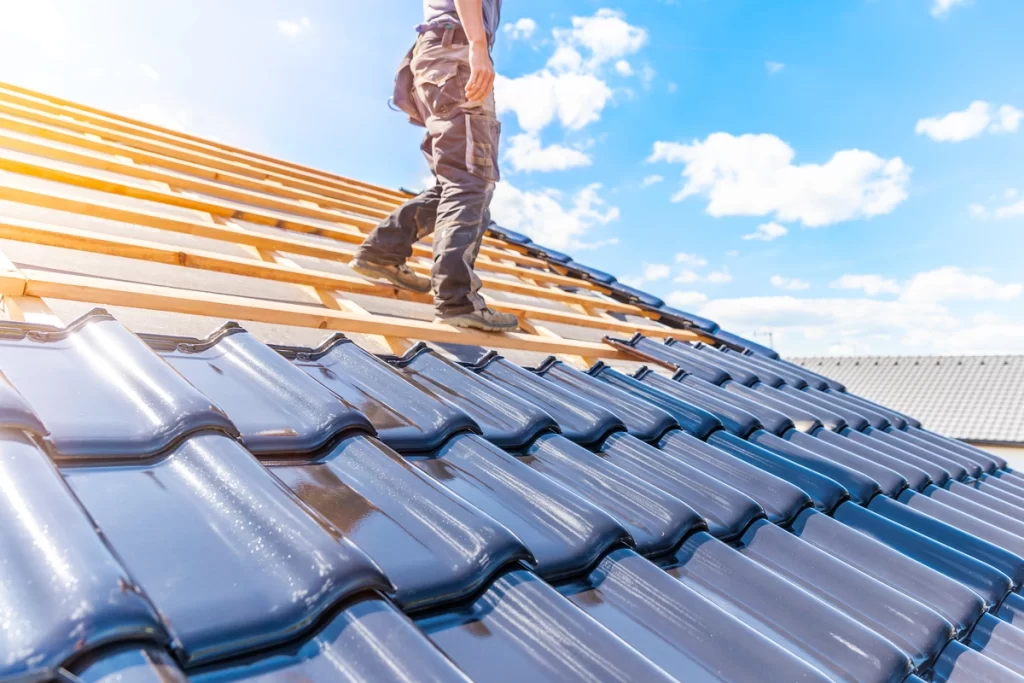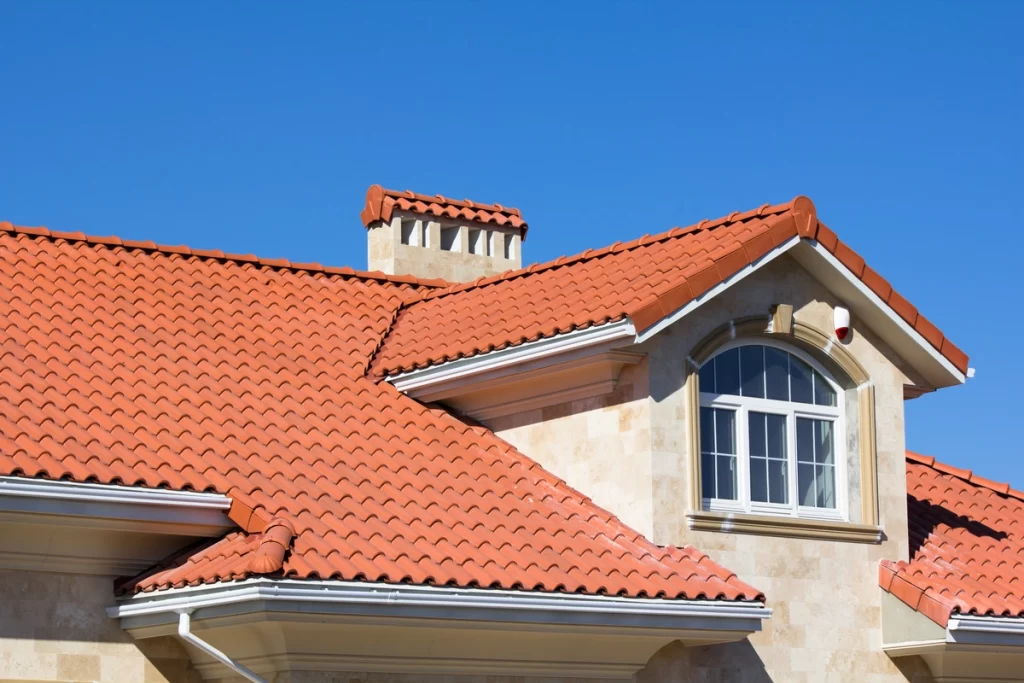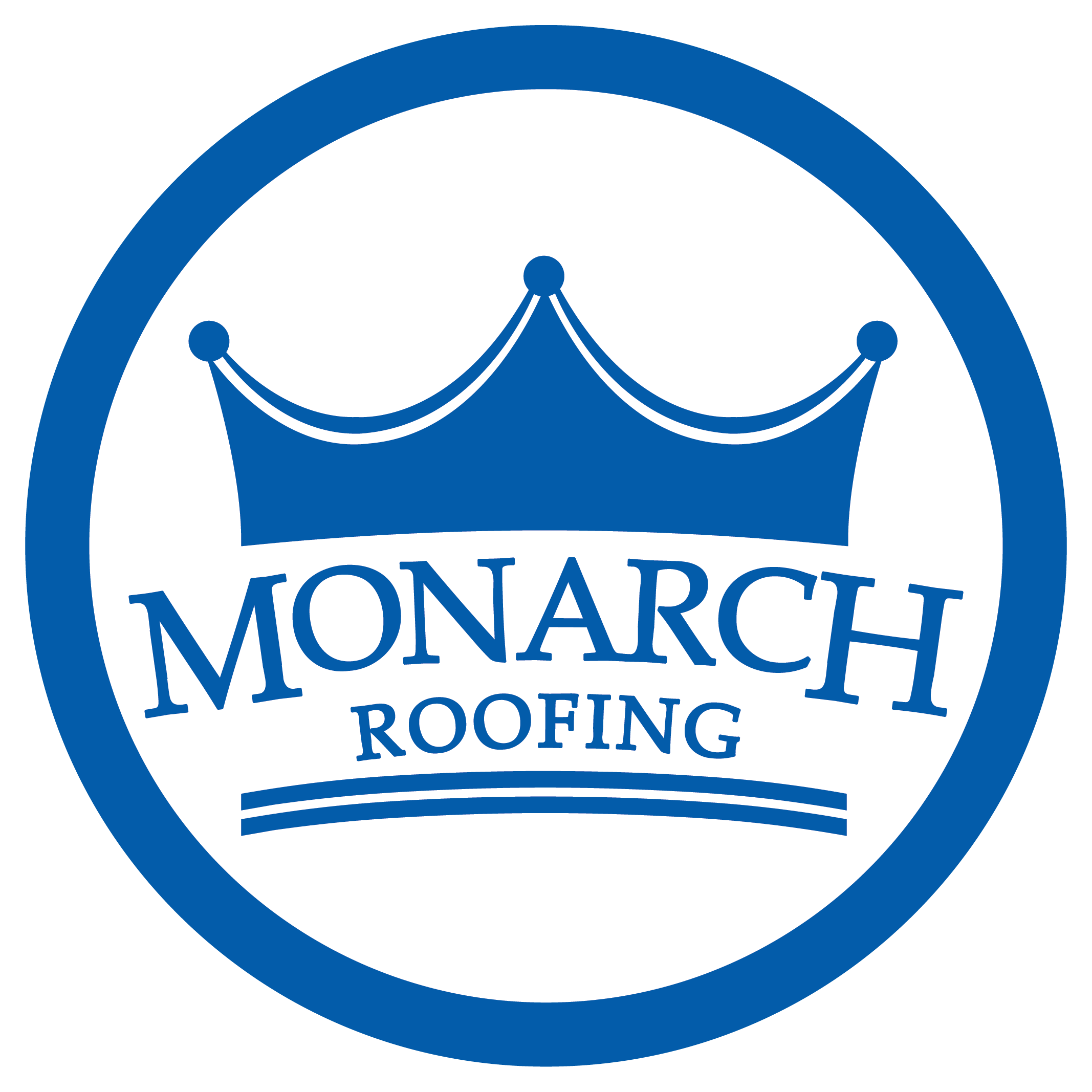When it comes to roofing materials, roof tiles have been a popular choice for centuries. They offer a blend of durability, aesthetics, and energy efficiency that few other roofing materials can match.
In this comprehensive guide, we’ll take you through:
- The world of roof tiles
- The various types available
- Their pros and cons
- Costs
- Maintenance requirements
- Lifespan
Ready to install a brand new roofing system, but not which material or styles are perfect for you? Get informed here.
Pros and Cons of Roof Tiles

Wondering if roof tiles are the right choice for your property? Here are some the pros and cons:
✅ Pros:
- Durability: Roof tiles are known for their exceptional durability, often lasting for decades or even centuries when properly maintained. They can withstand harsh weather conditions, including heavy rain, snow, and high winds.
- Aesthetic Appeal: Roof tiles come in a wide range of colors, styles, and materials, allowing homeowners to choose a roofing option that complements their architectural style and personal preferences. Whether you prefer the classic look of clay tiles or the sleek appearance of concrete tiles, there’s a tile type for you.
- Energy Efficiency: Some roof tiles, particularly clay and concrete tiles, have natural insulating properties that can help regulate indoor temperatures. This can reduce energy consumption for heating and cooling, ultimately leading to lower utility bills.
- Low Maintenance: Roof tiles are relatively low-maintenance compared to other roofing materials. They resist rot, mold, and insect infestations, which can be common issues with wood or asphalt shingles.
- Environmentally Friendly: Roof tiles are often made from sustainable materials like clay or concrete, making them an environmentally friendly choice. Additionally, they can be recycled once they reach the end of their lifespan.
❌ Cons:
- Cost: One of the main drawbacks of roof tiles is their initial cost. Roof tiles are typically more expensive to install than asphalt shingles or metal roofing. However, their longevity can offset this higher upfront expense.
- Weight: Roof tiles are heavy, and not all roofing structures can support their weight. Before choosing roof tiles, it’s essential to ensure that your roof’s structure can handle the load.
- Installation Complexity: Installing roof tiles requires expertise and precision. Improper installation can lead to leaks and other issues. It’s crucial to hire experienced roofing professionals for tile installation.
- Fragility: While roof tiles are durable, they can be brittle and may crack or break when subjected to heavy impact, such as falling branches or hailstorms. Replacing damaged tiles can be costly.
4 Different Roof Tile Types
Roof tiles come in various materials, each with its own unique characteristics. Here are some of the most common roof tile types:
1. Clay Tiles:
- Pros: Clay tiles are renowned for their timeless beauty and natural colors. They are incredibly durable and can last for over a century. They are also environmentally friendly as they are made from natural clay.
- Cons: Clay tiles can be heavy and expensive. Installation requires expertise, and they are susceptible to cracking if not handled with care.
2. Concrete Tiles:
- Pros: Concrete tiles are a cost-effective alternative to clay tiles. They offer durability, energy efficiency, and come in a wide variety of styles and colors. They are also resistant to fire and pests.
- Cons: Similar to clay tiles, concrete tiles are heavy and may require additional roof support. They can also crack under severe impact.
3. Slate Tiles:
- Pros: Slate tiles are incredibly elegant and have a luxurious appearance. They are exceptionally durable and can last for generations. They are also resistant to fire and do not fade in color over time.
- Cons: Slate tiles are among the heaviest roofing materials, necessitating a robust roof structure. They are also costly to install, and replacement tiles can be hard to source.
4. Metal Tiles:
- Pros: Metal roof tiles, such as those made from steel or aluminum, are lightweight and durable. They are resistant to rust and can last for several decades. Metal tiles are also recyclable.
- Cons: Metal tiles can be noisy during rain or hailstorms if not properly insulated. They may also require periodic maintenance to prevent rust.
How Much Do Roof Tiles Cost?
The cost of roof tiles varies significantly depending on the material, style, and region. On average, the cost per square foot for roof tiles can range from $10 to $30. Here’s a rough estimate of the cost for different tile types:
- Clay Tiles: $15 to $30 per square foot
- Concrete Tiles: $10 to $20 per square foot
- Slate Tiles: $20 to $35 per square foot
- Metal Tiles: $10 to $25 per square foot
It’s essential to consider both the material cost and installation expenses when budgeting for a tile roof. Additionally, pricing may vary based on local labor rates and availability of specific tile styles.
How to Maintain Roof Tiles
Maintaining roof tiles is relatively straightforward, but regular inspections and upkeep are crucial to ensure their longevity. Here are some essential maintenance tips:
- Regular Inspections: Conduct visual inspections of your roof tiles at least once a year. Look for cracked or damaged tiles, loose or missing fasteners, and any signs of leaks.
- Clean Debris: Keep your roof clear of debris like leaves, branches, and moss. Accumulated debris can trap moisture and promote mold and mildew growth.
- Moss and Algae Removal: If you notice moss or algae growth on your roof tiles, gently remove it with a soft brush or low-pressure water stream to prevent damage.
- Gutter Maintenance: Ensure that your gutters are clear and functioning correctly. Clogged gutters can lead to water backup, which can damage the roof and tiles.
- Professional Inspections: Schedule a professional roofing inspection every few years to identify any potential issues early on.
How Long Do Roof Tiles Last?
The lifespan of roof tiles varies depending on the material and maintenance. Here’s a general guideline:
- Clay Tiles: 50 to 100+ years
- Concrete Tiles: 40 to 75 years
- Slate Tiles: 75 to 150+ years
- Metal Tiles: 40 to 70 years
Proper maintenance can significantly extend the life of your roof tiles. Regular inspections and timely repairs can help you get the most out of your investment.
Learn More About the Different Types of Roof Tiles

Roof tiles offer a durable and aesthetically pleasing roofing option for homeowners. While they may come with a higher upfront cost and installation complexity, their long lifespan and energy efficiency make them a worthy investment. With proper maintenance and care, roof tiles can protect your home and enhance its curb appeal for generations to come. Whether you opt for classic clay roofing tiles, versatile concrete tiles, elegant slate tiles, or modern metal tiles, the choice is yours, and the benefits are undeniable.
Contact Monarch Roofing to help care for your roofing system today!





